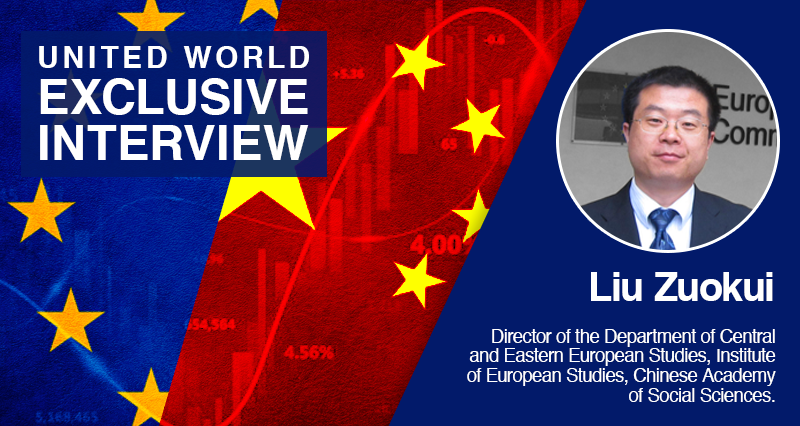The European Union and the People’s Republic of China announced on the last days of the year 2020 that a Comprehensive Investment Agreement (CAI) was finally reached after years of negotiations.
United World International spoke about the CAI with Dr. Liu Zuokui, Senior Research Fellow and Director of the Department of Central and Eastern European Studies within the Institute of European Studies in the Chinese Academy of Social Sciences.
“Agreement of great significance”
How is your general evaluation of the CAI?
The CAI reached on December 30, 2020 is a deep, comprehensive and high-level investment agreement negotiated between China and the EU. The completion of the negotiation of the agreement shows China’s determination and confidence in promoting a high level of opening up, which is conducive to the construction of a new development pattern with domestic circulation as the main body and domestic and international double circulation as the promotion, and the further improvement of market resource allocation and market-oriented reform. The agreement is of great significance in promoting the sustained and in-depth development of China-EU relations, safeguarding the external environment for China’s reform and development, and promoting globalization, free trade and multilateralism.
What is your expectation from the CAI concerning EU-China trade and investment?
China has signed bilateral investment agreements with many European countries, most of which were completed in the 1980s and 1990s. Compared with the previous agreements signed by China and EU Member States, the agreement reached in this negotiation has higher standards, involving market access, transparency, labor treatment, environment, investment arbitration and other aspects. Among them, market access is the most important part of the negotiation.
CAI will provide further legal protection for the cooperation in economy, trade and investment between China and the EU, promote a more balanced, sustainable and in-depth development of bilateral trade, help to consolidate the comprehensive strategic partnership between China and the EU, and enable enterprises and people of both sides to obtain tangible benefits from the agreement.
The CAI needs approval by the European Parliament. But there is also severe opposition in the EP against the CAI. Do you think it will still be approved?
Some members of the European Parliament, who doubted China’s sincerity in implementing the agreement, opposed the conclusion of CAI. But I think the subsequent ratification is not only a political issue, but also a legal issue. I have confidence in the professionalism of Europe and believe that the agreement will eventually be approved and passed.
“I believe the agreement will be approved and passed in Europe”
On February 24, the European Commission and the European Parliament’s International Trade Committee exchanged views on the CAI. This is the first “debate” on this topic held between the two major EU institutions after the conclusion of CAI.
The tone of the discussion on the agreement is quite positive. For example, some members think that the CAI is very exciting. It’s a surprise that the EU has achieved results they have been pursuing for a long time, such as market access, fair competition, including the principle of non discrimination of state-owned enterprises, subsidy transparency, compulsory technology transfer, and so on. Moreover, there are very clear commitments to “sustainable development”, such as the relevant conventions of the international labor organization.
The representative from EC also emphasized that the CAI only represents one aspect of EU’s path to China, and the EU maintained contact with China. The EU also has its own measures, such as legislation on foreign government subsidies being prepared, export control regulation, due diligence and other tools being developed to protect its values. China’s economy and politics are very complicated for the EU. The EU can’t include all its China Strategies in one agreement. Therefore, engagement on the one hand and independent measures on the other should be developed.
CAI “solid foundation” for free trade agreement
If the CAI is approved, do you expect new bilateral steps? If so, how would the CAI be continued?
If CAI is finally reached, it will inject new vitality into the development of China EU bilateral relations, and at the same time, it will lay a solid foundation for the launch and signing of China-EU free trade agreement. The significance of CAI negotiation itself is to solve the structural problems between the two markets, especially to promote the simultaneous improvement of the business environment between the two sides and speed up the efficiency of trade and investment flows between the two sides.
Therefore, in the future negotiations, CAI should focus on the major common interests of both sides, focus on solving the problems of market access and fair competition, and promote the structural reform of both sides in their respective fields. The opening-up of both sides should be synchronous and opposite, not based on unilateral concessions.
Do you see a connection between the CAI and the ‘Belt and Road’?
At the second International Cooperation Forum for the Belt and Road, which was held in 2019, the Chinese side put forward to high quality development of the Belt and Road. The so-called “high quality” means high standards, benefiting people’s livelihood and promoting development. The high quality cooperation on the trade and investment between China and the EU is the key element for the Belt and Road construction in Europe. CAI means a high quality legal guarantee of China-EU trade and investment cooperation. It will lay a very good foundation to promote China-EU Belt and Road cooperation.
How will the CAI affect US-China relations?
This is a very complicated issue. China hopes that the conclusion of this agreement will benefit China, the United States and Europe.
In reality, it is true in some ways. Many provisions of the CAI are based on “most favored nation treatment” (MFN), which benefits not only EU investors but also other trading partners.
In the view of some Americans, CAI may affect transatlantic cooperation, thus posing a threat to the United States. In fact, this agreement will also contribute to the development of Sino-US relations.
The demands to China of the United States and Europe in many aspects of the economic and trade field are the same, that is, part of the contents of the agreement is also what the United States should do, which is mainly reflected in: requiring China to improve market access and increase trade reciprocity, strengthening intellectual property protection, eliminating compulsory technology transfer, reforming state-owned enterprises, etc.
Can the EU and the US “benefit simoultaneously” in China?
At the same time, the agreement also reflects the differences between Europe and the United States. The core issue is whether Europe and the United States can “benefit simultaneously”. The U.S. side believes that if Europe takes the lead in reaching the agreement with China, it means that the United States is facing losses in the Chinese market. Because Europe and the United States can not benefit simultaneously, they are facing the risk of being “divided and ruled” by China in the face of interests, and may lose more pricing rights to China due to lack of unity.
What effect has the CAI on the Middle East? What opportunities does it offer especially to Turkey?
Perhaps, the CAI provides a good template for in-depth cooperation between China and other partners in the world. With the acceleration of China’s reform process and greater degree of market access, enterprises and investors in the Middle East will have greater opportunities to gain greater market share in China. This effect is partly brought by CAI.
China is to further expand market reforms and build a high quality area with the help of CAI. This also brings opportunities to Turkey. As everyone knows, China has BRI construction projects in Turkey. China ushered in the centenary anniversary of the Communist Party’s founding in 2021. Turkey will celebrate 100 years of the Republic’s foundation in 2023. The two sides should take this opportunity to intensify their strategic cooperation and tap potential in infrastructure construction and other aspects, so as to promote bilateral cooperation and achieve stability.
The CAI can “become a promoter of a new world system”
Is the CAI part of an emerging new world system?
Now, it’s too early to make such a judgment. We can’t judge how much concrete impact a CAI can have on China EU relations, which will take time to prove. If it is indeed a mutually beneficial and win-win agreement, which greatly promotes the development of China-EU economic and trade relations and has an impact on the formulation of trade and investment rules in the world, it should become a promoter of the formation of a new world system.









Leave a Reply